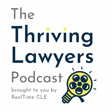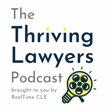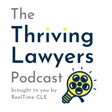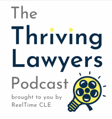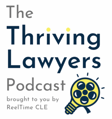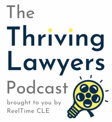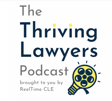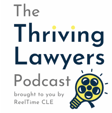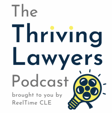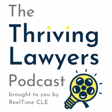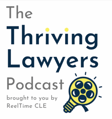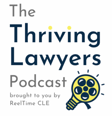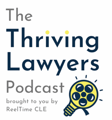Law School Reflection: Avoiding Traditional Legal Culture
00:00:02
Speaker
When I graduated from law school, I took one look at all the jerks around and the mess that I saw in the polarization. I'd been divorced when I was in law school. I had, you know, had some run-ins with law students who were competing with me and it was kind of like, you know, I didn't even know they existed and they were competing with me. It seemed so dysfunctional. And I said, I don't want any part of that. I don't want that culture. And so I had to figure out what I did want.
Introduction to Integrative Lawyer J. Kim Wright
00:00:35
Speaker
Welcome back to The Thriving Lawyers podcast. In this week's episode, join Michael Kahn for a wide ranging discussion with J. Kim Wright, integrative lawyer, author, innovator and systems change agent. Welcome back to The Thriving Lawyers podcast. This is Michael Kahn. Today we have a friend and she tells me that we we did a program together and 20 years ago is when we met for the Mecklenburg
00:01:04
Speaker
North Carolina, Methmore County, North Carolina bar in Charlotte, North Carolina. And her name is Jim J. Let's try that again. J. Kim Wright, JD. And let me just, let me just tell you just, we joked that if I went through all of her accomplishments, we'd have about five minutes left to talk. So this is an abridged list of her accomplishments and books, websites, et cetera.
00:01:33
Speaker
She is the founder and director of Cutting Edge Law. And we'll have her websites connected to the, in the liner notes, I don't know if they call it liner notes, I thought you used to call it for albums, but the notes for the podcast. She's co-creator and manager of Conscious Contracts, sponsor of the Integrative Law Movement, visiting clinical professor of
00:02:01
Speaker
Quinnipiac. Am I pronouncing that right? Quinnipiac. Quinnipiac University School of Law. Okay. And co-editor of Trauma Informed Law, Primer for Practicing Lawyers, that was published this year by the ABA. Will be. Will be. Will be. To come. And author of Lawyers as Peacemakers, Lawyers as Changemakers. I believe I have a little blurb in that one, Kim, if I remember correctly. I think I do.
00:02:29
Speaker
and contributor to the best lawyer you can be, a guide to physical, mental, emotional, and spiritual wellness. And the author or editor, I guess, is Stuart Levine. And she is, I know it's Stuart Levine, I think, she's a contributor. And then a couple more, 50 lessons for women lawyers. She is a contributor to that.
00:02:54
Speaker
and 50 Successful Women Lawyers by Nora Riva Bergman. She's a contributor to that. So two, those look like they're, Kim, that'll be my first question. What's, oh, one is 50 Lessons for Women Lawyers and the other's 50 Successful Women Lawyers. Okay, so you're a contributor to both. It's the subtitle. It's the same book with a subtitle. Oh, it's the same book. Okay, very good. So it's one book, 50 Lessons for Women Lawyers,
00:03:22
Speaker
I'll read the whole subtitle then from women lawyers, career and life lessons from 50 successful women lawyers. Okay. And she's got plenty of other stuff. She's got her own website, jkim, right? So we're not going to go through everything and she's on social media, but we'll have, we'll have those links for you with the, when the podcast is dropped. So that took already three minutes of our time.
00:03:50
Speaker
Kim. J. Kim Wright is here with us, but I'm going to call her Kim. Kim, good to see you again. It's good to see you, Michael.
Balancing Productivity and Work-Life as a Lawyer
00:04:00
Speaker
So where do we start? The first thing I want to start is sort of this productivity piece because I like to keep busy.
00:04:17
Speaker
And I like to write. You'll see, by the way, listeners, you'll see that that statement is true. Very true. And I don't do anything that I don't love doing. And so the question for me is always looking for that balance. And one of the things I've tried this year that I'm so far really loving is that I am not scheduling anything on Mondays and Thursdays.
00:04:45
Speaker
And so if people want to talk to me, they talk to me Tuesday, Wednesday, or Friday. But I have a lot of standing appointments. And so just having random conversations is starting to get a little rare, unless the universe opens up and people have the exact moment that I have an opening. And so I've been really going with the flow about that.
00:05:16
Speaker
Well, I'm fortunate to get you so quickly then. And I love that, by the way. I love that you're setting aside those two days for no. Is it no appointments or no meetings or is it nothing scheduled just for you to be able to focus on writing or whatever it else you're doing? It's nothing scheduled. And like last week, I had a photo shoot with a makeup artist came in and did my hair and makeup.
00:05:45
Speaker
before the photo shoot, and that was how I spent my day. There are some times that I actually go and repot plants, or once a month I have a two-hour massage, usually on Monday, but Thursday if Monday doesn't work for the massage therapist. And having that time has just transformed my relationship to what there is to do. And so, you know, like that,
00:06:16
Speaker
busyness that is like the badge. I don't have that anymore. Like I don't have that sense that there's never enough time because I have time I've set aside time and I even take weekends. And I work when I want to work. And so like, you know, sometimes on Monday, if I'm not doing anything else, I work on my to do list and and collecting like all the little notes and pieces around and actually just
00:06:44
Speaker
putting it all on the to-do list. And my to-do list has notes on it to remind me. So it's not a to-do list. It's more like a running journal of all the projects I'm working on. And I have a lot. I have so many projects that I often forget to, like if somebody says, rattle them off, I forget. But the to-do list keeps them there, so I don't have to worry about them. And so...
00:07:12
Speaker
So anyway, when people think I'm busy, they immediately think I must be really hard to get. Well, I'm not hard to get when I'm working on something that I'm really passionate about and it's urgent, but I am hard to get if it's something new because I have a full plate of all the really wonderful things that I'm working on already. Let's just start with, and that's a good start by the way, we started with a good pointer about
00:07:42
Speaker
of well-being, setting aside two days, no appointments. So how would you describe yourself, Kim? How would you describe? Because I'm not going to try. How would you describe, gosh, I mean, even saying what you do isn't the right question. But how would you describe? No, it's not about what I do. You're a JD. Yep. You don't practice law.
00:08:08
Speaker
But I did for like 20 years. You did, yeah. But for now, yeah, you did. So talk and start wherever you want to in terms of who you are.
Transforming the Legal Profession: New Approaches
00:08:17
Speaker
Well, about 20 something years ago, I took on transforming the legal profession as my main project for the rest of my life. And at that point, I'd already been practicing law. I'd been experimenting with ways of doing law differently. So, you know,
00:08:35
Speaker
When I graduated from law school, I took one look at all the jerks around and the mess that I saw in the polarization. I'd been divorced when I was in law school. I had some run-ins with law students who were competing with me and it was kind of like, I didn't even know they existed and they were competing with me. It seemed so dysfunctional. And I said, I don't want any part of that. I don't want that culture.
00:09:03
Speaker
And so I had to figure out what I did one. And so for the first several years, I've kind of worked in the nonprofit world. I was the director of a domestic violence program. I did some other nonprofit kind of work. Then I discovered this movement.
00:09:25
Speaker
There was a I was doing personal a lot of personal growth and consciousness kind of work and I went what year was this Kim? So the year that I'm about to tell the story about was not before And what did that book the book transforming practices? I
00:09:42
Speaker
It came out in 99. You remember that book, right? Stephen Kieva, the author of that book was a very dear friend of mine, a very dear friend. And he has unfortunately passed, right? He has passed. Many a few years ago. But he wrote that book, Transforming Practices. That's what we practiced this. I still have, yeah. So go ahead. I think it came out in 99.
Exploring Collaborative Law and Restorative Justice
00:10:02
Speaker
In those mid to late 90s, it was sort of like,
00:10:07
Speaker
a little of this and a little of that and I found Stu Webb who had created the collaborative law model and I found restorative justice and you know I was I was finding these things that had that sort of that healing peacemaking more humane and conscious approach to law so I was experimenting with all of it. And this is right out of law school you already knew
00:10:29
Speaker
because of your experience in law school and as you said with the jerks that you were already dealing with outside. And when you say jerks, do you mean in terms of how their people skills, how they treated you, the kind of buggy dog world or that kind of stuff? Yeah. And I'm really clear that it was how the system is designed. Like the system is designed for us to be jerks and to not trust people.
00:10:56
Speaker
Yeah. And so I've got really interested also in systems change and systems theory and, you know, how do you how do you actually make change at the systemic level? Yeah. Yeah. Yeah. And so in psychology, the whole idea of systems theory, psychology. Yeah. So there was this whole soup of the 90s where I was just sort of this laboratory for all this stuff coming in and practicing law.
00:11:24
Speaker
and building a law practice in a small town in North Carolina. And I used to say it was 25 miles in 25 years from Chapel Hill, North Carolina. What town are we in? I'm not going to say now that I've said that. They're still 25 miles in 25 years from Chapel Hill. And down the area. OK. All right. So small town. And you got out of law school and opened up your own practice? Yeah. Yeah. Eventually, I did that nonprofit work first. Oh, right.
00:11:54
Speaker
And so five years out of law school, I opened my own practice. And I mean, I had a parcel of children. I had, you know, this amazing complex life that was not conducive to going and working for a big firm. I was once interviewed by one of the big firms when I was in law school and I left the interview and thanked them for their time.
00:12:22
Speaker
I rejected them. What led you to get up and leave? The people who were interviewing me were kind of flat-affect. The questions they were asking were not the things that I was concerned about. I just looked at them and said, I don't think we're a good match. I thank you for your time. I hope that you can get a cup of coffee with the rest of your time.
00:12:50
Speaker
before your next appointment and, you know, good luck with your interviews. Good for you. So you could tell this is not, this is not happening. This is not a good fit for me, values wise or whatever else. So why waste both of our times? Yeah, I was in my thirties by then. Yeah. And so, you know, like, I'm not sure that I would have had that kind of clarity in my twenties. Yeah, for sure. But yeah, it was like, you know,
00:13:20
Speaker
Definitely not a match. So you knew back then, back in the 90s, back in law school and then once you're out practicing that there was something very wrong with the system and that lawyers can't help but come out of this training in law school and then in terms of getting immersed in the system, it's the rare lawyer that can come out of that without being
00:13:50
Speaker
quote, unquote, jerk or stressed out or whatever. Now, of course, their lawyers should do. But but it's really takes going against the grain because of the system. It and it takes a lot of courage, because we're considered weird. Like, I was willing to be weird.
00:14:07
Speaker
I remember having a conversation with a judge. We were doing a program called lawyers as peacemakers and he actually had a degree in divinity and had a lot to say about being a peacemaker from the bench. And we're sitting at the speaker's table and having this conversation and he asked me something and my answer to him was, I am willing to be the weirdest lawyer in town. And that way anybody else can experiment with anything they want.
00:14:38
Speaker
And they don't have to worry about having that accusation. So what did weird look like? So weird looked like I was doing mediation before
Creating a Unique Law Practice with Peacemaking Approach
00:14:48
Speaker
mediation was cool. I was doing collaborative four-way meetings before anybody even knew what collaborative law was. I had a social worker in my office. I had interns coming from the social work school and from the law school and doing support groups with my clients. Wow.
00:15:08
Speaker
I had, and remember this is in the 90s, I had to go to the bar three times because I didn't want to get in trouble with the ethics folks about multidisciplinary practice. And so I kept saying, this is what I want to do. And they would say, well, you can't do that because, but as soon as they gave me the because, I fixed that and I sent it back. So three times before I figured out a way that worked. So I had a mediator and a social worker who was a coach
00:15:39
Speaker
And you know like this whole law practice I treated my staff like they were actually team members and You know, I was a very popular employer people would stop by and say, you know next time you have an opening. It's mine. Yeah and and I also Like we had a support group at the in the schools with one of my
00:16:06
Speaker
One of my people was a former school counselor, and she did support groups in the schools. And then when you say schools, the law schools or? For children whose grade schools for children whose parents were going through divorce. Oh, wow. And so I did a lot of divorce work because being a woman in a small town in North Carolina, that's what came in my door. But then people started saying, well, would you would you help me do this for my business?
00:16:37
Speaker
And so I started doing sort of a more peacemaking approach and more conscious approach to contracts. And officially I had a general practice, but it started out family law and then it moved into having an ongoing relationship with my clients.
00:17:00
Speaker
who had businesses and wanted to have the same kind of relationship. So I kind of had an eclectic practice. And so I was a mediator at a time when people said mediation would never last. And how dare they try to impose peacemaking for lawyers that was going to take money out of there.
00:17:30
Speaker
out of their coffers. Right. Let me just, and I just want to interrupt here, but I want you to continue to share your journey, and we're up to now where you are. But would you say that part of the sick system, I guess, is billable hours?
Critique of Billable Hours in Legal Practice
00:17:53
Speaker
Oh, absolutely. I gave up billable hours decades ago. That was one of the first things that I figured out
00:18:00
Speaker
I didn't like living by the billable hour and my clients didn't like the billable hour. And so we didn't have all the articles and the research and all of the conversations about it. I just knew it was the thing to do. So I just have a conversation with my client and look at their budget and their needs and my budget and my needs and the amount of time it was going to take in terms of expectations and then
00:18:29
Speaker
carved out a sense of how much it was going to be. So how are things going in the legal community in terms of changing that? I know that there are some firms who are not doing global hours, right? There's certainly some movement, but is it pretty glacial, I guess, in terms of the change?
00:18:57
Speaker
All change is glacial in law because we've been trained about precedent. So we're always looking back for evidence of whether something's going to work. And we're living in a world where that isn't effective anymore. Looking forward to what do people actually need, what's going to work, is not something we are trained to do. And we are trained to be
00:19:25
Speaker
really frightened about taking a risk and really frightened to be different, any kind of change, any kind of weirdness, you know, like, you know, that being the weirdest lawyer in town, because you because you stopped billing by the hour. Like somehow that, you know, like the whole system's going to collapse and in fact, it will. Like the big law is depends on that. And, and
00:19:51
Speaker
They really are missing the boat by not finding a creative approach that is going to save them. Are there any medium to big law firms who have shifted from that? Or is it only just kind of the boutiques and smaller firms? I haven't seen a big law firm. I think that there may be certain lawyers in some big law firms, but I haven't seen a big law firm.
00:20:21
Speaker
Yeah. I'm not sure the article has been published yet, so maybe I shouldn't mention the author, but someone who I know very well wrote it has definitely made it one of his life purposes to help influence the shift away from Bill Bowers, but he's talked about how it
00:20:48
Speaker
causes lawyers to lose or can cause lawyers to lose connection for why they were attracted to practicing law in the first place. Because the focus is so uniformly on the billable hours. We've got to get these billable hours in. And that's what they become, these kind of automatons, just making sure they reach that number, whatever it is, 1750 or 2000 billable hours, right?
00:21:18
Speaker
Yeah, I don't know if you know Stephanie West-Allen. She's a lawyer turned mediator, turned neuroscientist, and now she's actually working with writers. But a few years ago, she did a talk looking at what the billable hour does to our brains. And one of the things that really has stuck with me is that compartmentalizing
00:21:48
Speaker
I do a lot of talks that let me know at 45 minutes I have to shut up and my body is trained at 45 minutes. I just stop because I've trained myself. Well, if you're doing billable hours, every six minutes your brain thinks it's time to do something else or to tick the box or whatever.
00:22:12
Speaker
And when we go home at the end of the day, and our children are trying to tell us a story, that's still running. You know, like, what, you know, like, we're wasting time. We're wasting time, right? That's right. I got to be can't just be sitting here doing, quote unquote, nothing. Nothing. Yeah, it's an unconscious thing, too. It's not necessarily something that they're thinking. Yeah, it's a pattern that gets built in the brain.
00:22:40
Speaker
And then, and it's why our relationships suffer. Yeah, that because you think that it just takes lawyers out of, you hear the, of course, the idea of mindfulness and being present. And is that, is that one of the obstacles for lawyers that if they're constantly worrying about the six minutes and they need to be
00:23:08
Speaker
moving on to the next thing or make sure that I'm doing something that's tangible, then they're not being present with whoever's in front of them. Yeah, well, think about even in mindfulness, they're doing it for a time. Yeah. You know? Yeah, that's true. A lot of the mindfulness teachers actually say, you know, try doing it for six minutes. And it's playing into that pattern.
00:23:37
Speaker
so that even being mindful is about that pattern of the brain. So talk, I'm curious, like I said, there's so many different ways I could go with you, Kim. Talk first about the book, Lawyers as Peacemakers.
Mainstream Acceptance of Holistic Law Practices
00:24:00
Speaker
And then I want to, after we talk about that, I really want, because I know we don't have a lot, we don't have like four hours to talk, which I'd love,
00:24:08
Speaker
I really want to talk about what's going on with you now. Like, what are the things that you're focusing on now? Yeah, I think it helps to understand that book first. Yeah, because a lot of the things that I wrote about in 2010 and lawyers as peacemakers are now the cool things to talk about. So that first decade of the 2000s, I was I was learning about everybody else's work. And, and
00:24:34
Speaker
Meeting a lot of other people so I you know, I was in the laboratory and then I went out and started reaching out to other people and and I in 2008 I was practicing law in North Carolina and I Decided that because I had this big community. I wanted to do so wanted to have a magazine that was how it occurred first and and that year
00:25:03
Speaker
was the year that the Independent Press Association went out of business and said that magazines were dead. And so I ended up going online. And it's so hard to imagine now because YouTube was brand new. And we used to have dial-up, and so we couldn't watch videos. And so YouTube came on at the same time internet was fast.
00:25:32
Speaker
I started traveling around the US, first in 2007 while I was still stationary, and then in 2008 I gave up my house and office, and I started interviewing these really interesting people that I had met at conferences, and they were now friends of mine. I remember that. I remember you saying you didn't have an address. I didn't have an address, no. You just traveled in state. I was a digital nomad before there was a term.
00:26:02
Speaker
And and I and I thought I was making a documentary that was the other thing but I decided to put him up on on YouTube and somebody from the ABA saw them these interviews and I saw the interviews and I got a call from an editor who said We actually here in the publications department have noticed a trend in law that's going in the direction that you're that you're talking about and
00:26:31
Speaker
But we didn't know that it had developed this far. And would you write us a book about what you've learned? And so I got to take all the things I'd learned and all the people I'd met and put it into a book. And so Lawyers as Peacemakers Practicing Holistic Problem-Solving Law was released, I think next week is the 12th anniversary. And it went to the bestseller list.
00:26:59
Speaker
immediately and so I mean a few people knew me but I kind of took that as it actually was a thing like you know that the lawyers as peacemakers and practicing holistically was something that the bar in general was interested in at least some of them and so I went from being the weirdest lawyer in the country at least to mainstream because the ABA published the book
00:27:29
Speaker
You know, like all of a sudden I was not just this weird person who spent the last two years camping in national parks As I moved from place to place But I I was mainstream and so the book, you know covers
00:27:48
Speaker
all the things that were really new then of mindfulness and different approaches to practice and coaching and how do you actually be a holistic lawyer?
Global Expansion of Integrative and Conscious Law
00:28:02
Speaker
And so that kicked off the stage of doing a lot of travel and being invited actually to go overseas. And so in 2012, my digital no madness became global.
00:28:19
Speaker
And my first trip was to Australia and then to South Africa and then to Europe and then to India. And this was to go to conferences to talk about. It was to speak. And I started developing workshops about what I was learning and people would pay my expenses. And, you know, I would have a I would have a few days of workshopping. But mostly when I got there, I got to meet more people and I got to expand
00:28:50
Speaker
the community. So all the stuff I do is in service of expanding this community. If I'm visible, if I'm writing, I'm reaching people. And so this is worldwide, this movement that you're leading or co-leading. I know there are other folks with you. Yeah, it's more of a movement that's
00:29:19
Speaker
emerging. And I'm one of the reporters. And I also am one of the people who looks to see what might be missing and what might actually help people come together. And, you know, like being visible was one of the ways that I served the movement. That concludes part one of our interview with J. Kim Wright. Look for our next episode to hear the rest of the interview.
00:29:49
Speaker
Thanks for listening to this episode of the Thriving Lawyers Podcast. We love hearing from our loyal listeners, so please feel free to email us any questions, comments, suggested topics, or guest recommendations at the following address, feedback at thrivinglawyerspodcast.com.
00:30:04
Speaker
The Thriving Lawyers Podcast is brought to you by Real-Time Creative Learning Experiences, a national provider of continuing legal education and professional development programs that leave participants engaged, encouraged, and equipped to pursue meaningful and sustainable change in their practices, their lives, and the organizations they work in. And by Osborne Conflict Resolution, your experience guides through the uncharted terrain of business and family law disputes based out of Charlotte, North Carolina. Thanks for listening, and we'll see you next time on The Thriving Lawyers Podcast.

